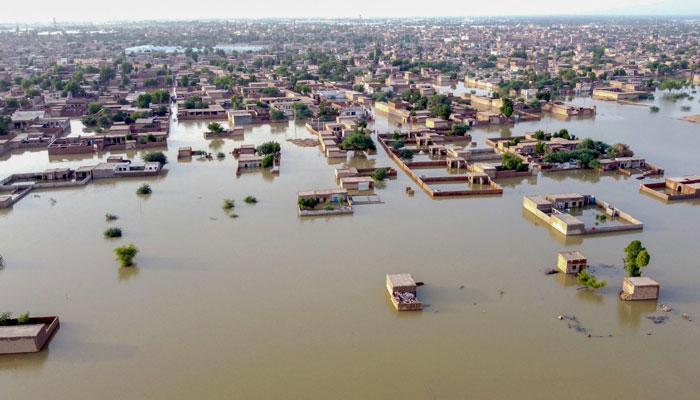Accumulated flood losses have likely grown to $22-24bn, economist says
Renowned economist Dr Hafiz A Pasha fears total losses on all accounts might swell to $30bn mark for already stressed economy
September 14, 2022

- Pasha fears total losses on all accounts might swell to $30bn.
- Says rise in losses would put more burden on already stressed economy.
- Livestock losses stand at $4bn and around $2bn on other accounts.
Renowned economist Dr Hafiz A Pasha has estimated that the total accumulated losses caused by severe floods on account of GDP growth, capital assets, livestock and others have touched the $22-$24 billion mark.
He expressed his fears that the total losses on all accounts might rise to touch the $30 billion mark for Pakistan’s struggling economy.
“We have worked out estimates on accumulated losses and also shared them with the government a few days back. Our estimates suggest that the country faced economic losses of $12 billion on account of GDP growth loss. The capital cost on account of damages to houses and other infrastructure caused $6 billion in losses.
"The livestock losses stood at $4 billion and around $2 billion on other accounts. So, in total, the worked out losses ranged between $22 to $24 billion a few days back when we shared our estimates with the government,” former minister for finance and renowned economist Dr Hafiz A Pasha said, while talking to The News on Tuesday.
He said the total accumulated losses might go up to the $30 billion mark, keeping in view the unprecedented rainfall witnessed by the country.
On the one side, Dr Pasha worked out the exact losses in totality and shared them with the government. On the other hand, the government so far seems confused to come up with its final estimates.
Soon after witnessing these unprecedented severe floods, the government came up with its initial assessment of losses and pitched the $10 billion mark. Then this cost went up to $12.5 billion. This cost was revised upward and the government came up with the assessment of losses to the tune of the $18 billion mark. In the meantime, the UN Secretary-General visited Pakistan and narrated the total losses to the tune of $30 billion.
Now the Ministry of Planning has shared a template with the provinces and assigned them to fill it out and send it back to the ministry as early as possible. The long template may require the provinces to take at least one week to respond after filling in the information. The planning ministry has been assigned to consolidate all information and then update the total accumulated losses.
The Ministry of Finance, Planning, and the State Bank of Pakistan worked together to ascertain the exact losses on the economic front. The Planning Commission had initially estimated that the total losses on the economic front stood at $9.3 billion.
The State Bank of Pakistan’s Research Adviser Dr M Ali Chaudhry stated in his tweets that “we find FY23 estimate of GDP growth drops to around 2% as of end-August data (against the envisaged target of 5 percent).
“We may be completely wrong. We countercheck going back to the 2010 floods. Our in-sample estimate for FY11 growth post-floods is 10 basis points away from the realised 3.6% real GDP growth. This gives some confidence in this approach, but a bottom design may be better,” he added. He stated that they will keep refining the high-level estimates as more tehsil-level info comes in the coming weeks.
On the other hand, the government has assigned the World Bank and Asian Development Bank the task of coming up with Damage Need Assessment (DNA). This will allow the government and donors to reconcile their figures while making requests to the international community to help Islamabad in launching its plan to construct or build back better in flood-affected areas.
Pakistan’s development sector expert and consultant on climate change Aftab Alam Khan, when contacted, said that this is a fact that Pakistan received unprecedented monsoon rains in 2022. Sindh and Balochistan provinces received nearly 500% and 437% above average rains, respectively. The gravity of climatic variations is evident in the fact that some areas of Sindh faced over 1,700 mm of rain this year. Such a catastrophe highlights need of a Loss and Damage Facility for Pakistan and similar countries.
“In the context of upcoming United Nations International conference on climate change known as Conference of the Parties 27 (COP27), Pakistan should join hands with other developing countries to put forward its case for the establishment of Loss and Damage Finance Facility, and demand G20 countries to ensure additional funds and G20 should also make real cuts in GHG. The conference is scheduled to take place at Sharmal Shaikh, Egypt from November 6 to 18.
“Loss and Damage refer to consequences of climate change that go beyond what people can adapt to and when the community doesn’t have resources to access adaptation options,” he explained.
Originally published in The News











